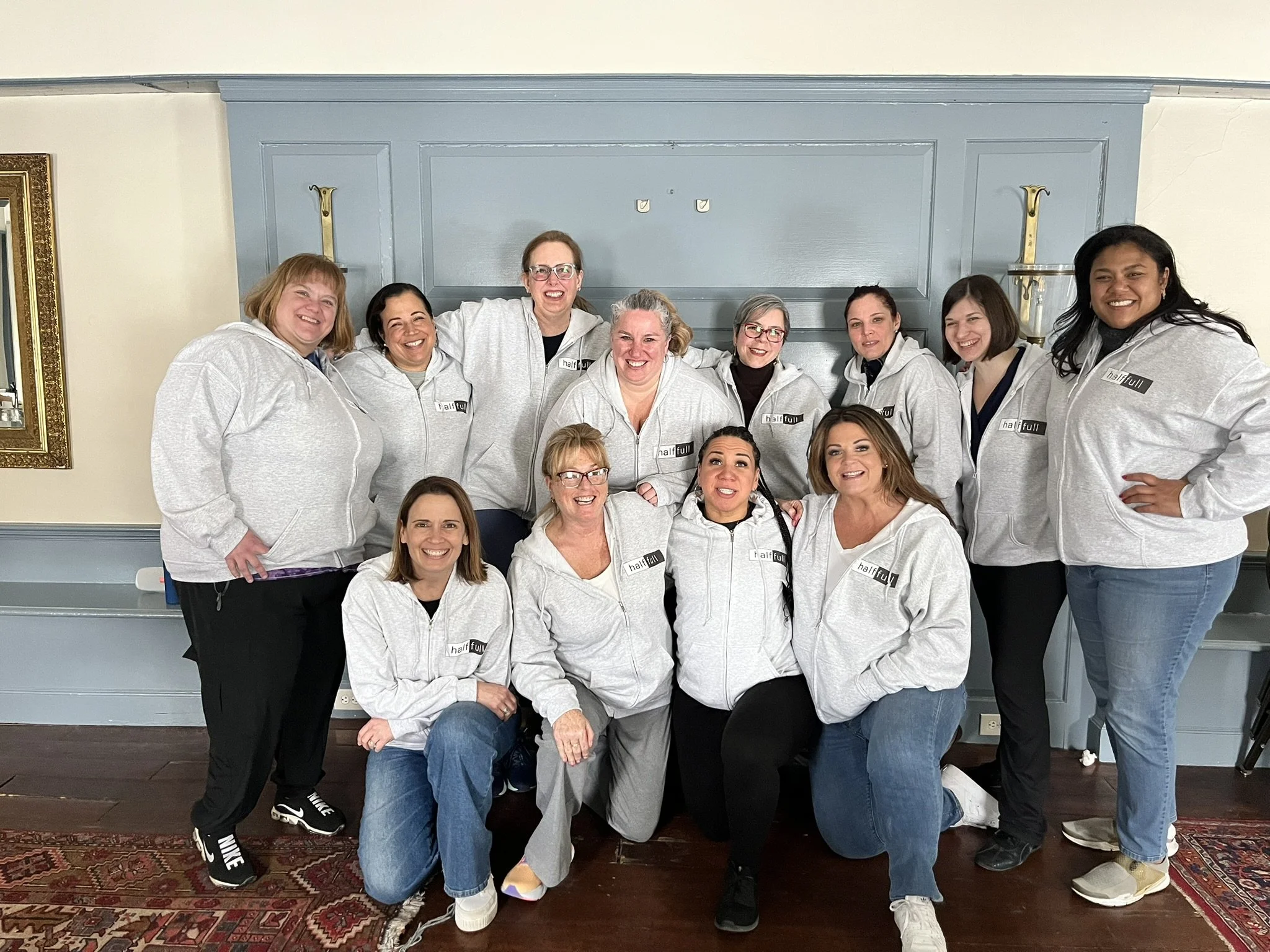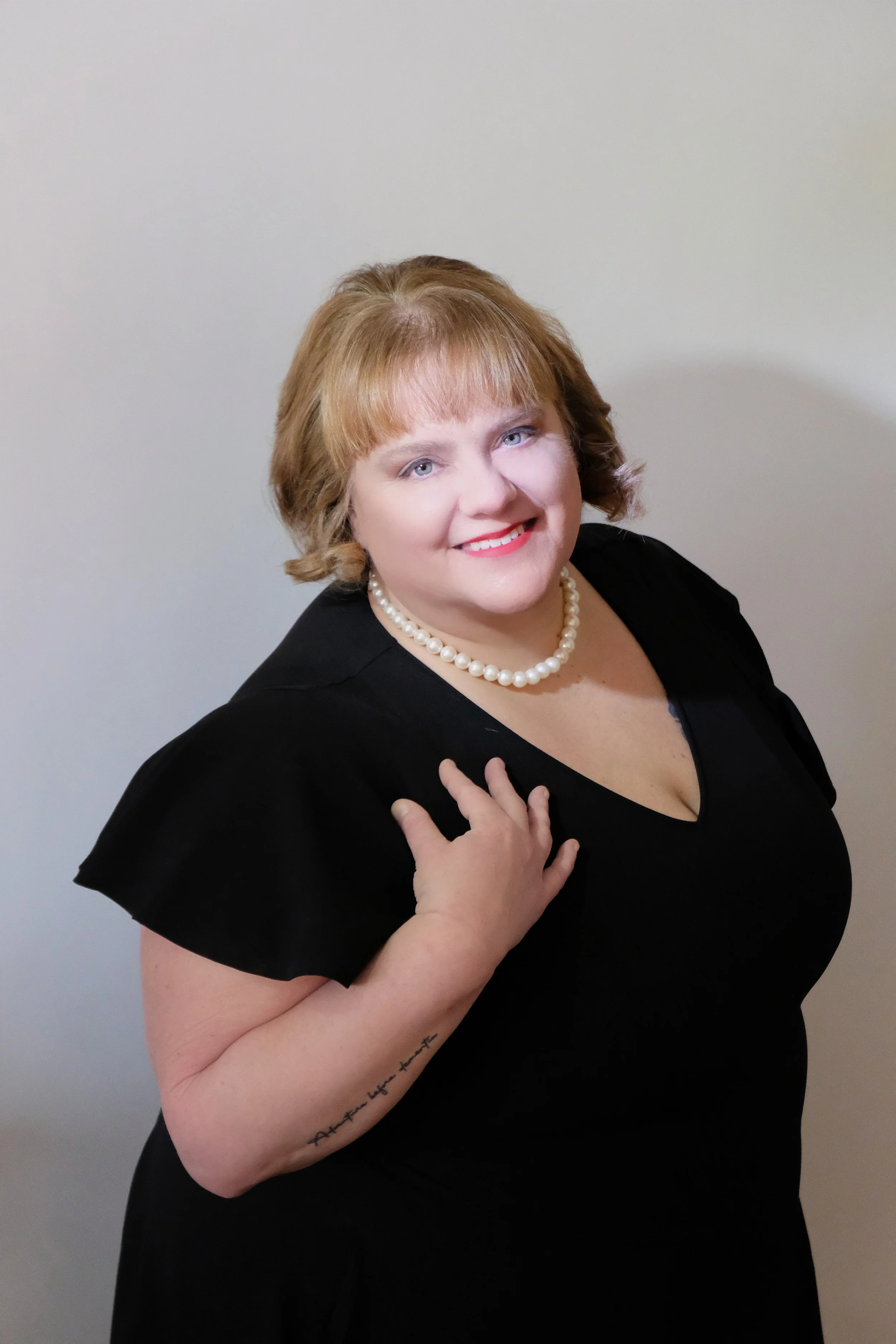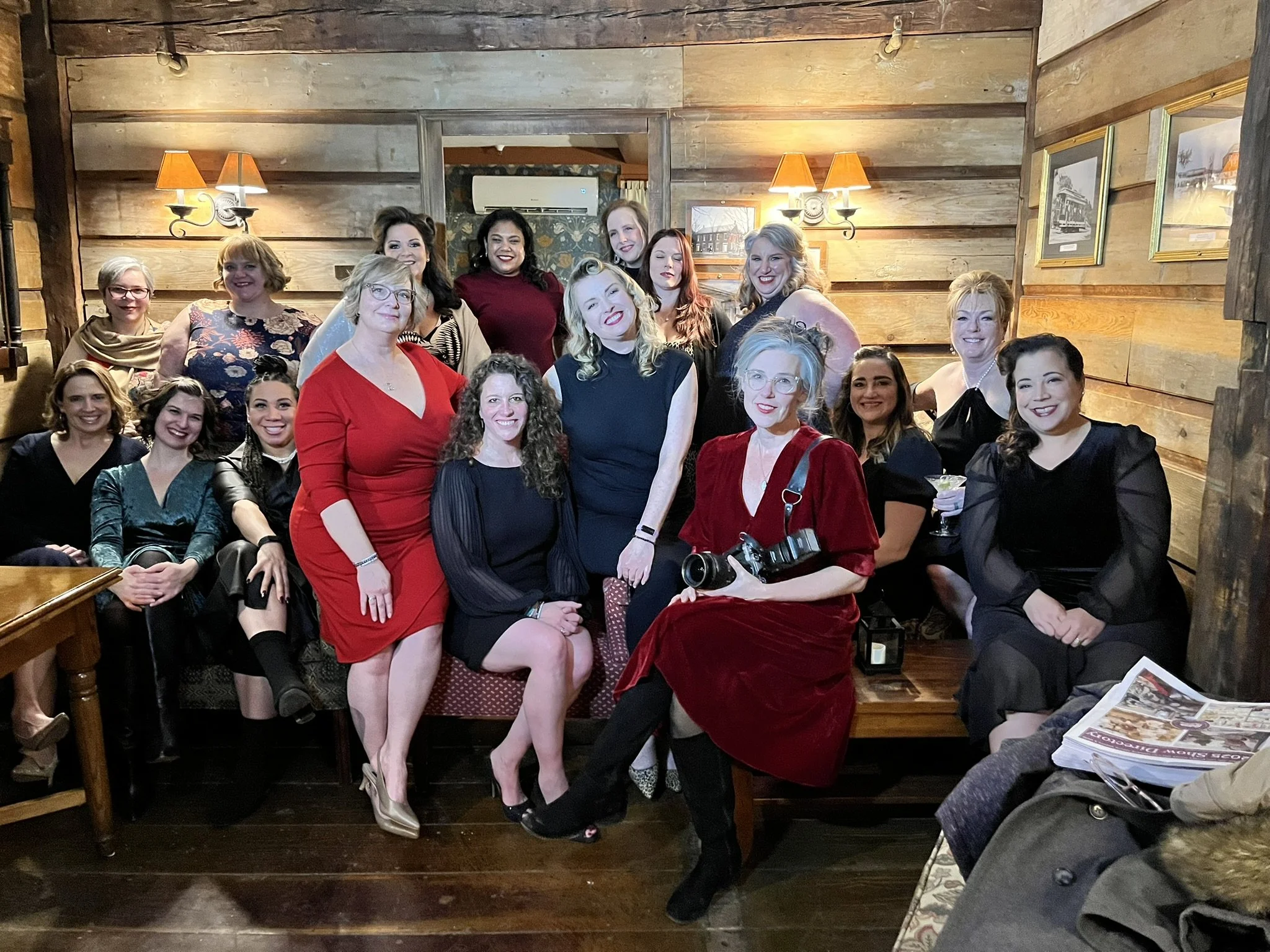Women’s Forward: An Experience to Shape Your Story
Authored By: Maggie Slane and Tracy Lombard, half full, llc, 2025 Women’s Forward Participants
On a cold, snowy Friday afternoon, I drove from my home near Providence, Rhode Island, to an inn called “The Publick House” in central Massachusetts. Sprawling colonial style buildings stretched out across the property, charmingly still adorned with Christmas wreaths in February; lots of snow and foot long icicles drooped down from the rooftops. Dragging my way too heavy suitcase up the steps to the front door (overpacking a clear sign of my nervousness) I wondered what the weekend would bring?
Along with 15 other women, 4 facilitators, 2 stylists, and a photographer, I stepped into half full, llc’s Women’s Forward — an experience intentionally named to remind us that this was no ordinary gathering. We weren’t here to step back. Instead, we were here to move forward. Through the introductions, I learned that the women in this room were all high-powered professionals at the top of their game. One founded a company to escort new medicines to market; another a wellness company; one was a former boxer; and still another ran point for a major construction company. Several of the women in the room had held public office and others were certainly destined to in the future. These were no shrinking violets.
And yet…
We had all arrived at the Forward at a crossroads in our lives — where the personal and professional had become mired in the muck and longed for clarity. Being in the company of these women was an incredible opportunity. And still, it hadn’t crossed my mind that I could — or should — choose something like this for myself. It was my boyfriend’s encouragement that nudged me to see what I might discover here.
Did you know? Registration is already open for our 2026 Women’s Forward; click here!
Let me be honest: I have never made it a habit to invest in myself. While I’ve always been a committed lifelong learner, I tended to tat it as something extra — an aside — not a part of my plan. Deep down, it felt selfish. My focus was always on giving more, proving my worth to others, overextending myself so I wouldn’t be judged.
And yet, there’s a growing consensus in modern career strategy that suggests we should rethink that default. Many coaches and thought leaders propose something like a 70/30 rule — devoting about 70% of our energy to excelling in our current roles, while intentionally reserving the remaining 30% to cultivate what’s next: learning, visibility, and growth.
Some of you already know these stats. But for me, it was shattering.
From Treading Water to Learning How to Swim
I grew up in a professional era where women had to give 125% just to be recognized alongside the boys. My best work — reports, memos, proposals — was only valued once my name was erased and replaced with a Fred, Peter, or Paul. That was the reality.
And the women I looked up to? They thought I had it good. After all, my ideas were at least allowed in the room. They had spent years typing the words that would never bear their names. They were thrown out of classrooms and offices for something as small as wearing slacks instead of the mandated skirt and pantyhose.
That was the story I inherited and the one I lived by for decades. Working much, much harder than everyone else became my way of survival. But in truth, it was less like moving forward and more like treading water: exhausting, relentless, and leaving me just barely in place. It kept me afloat in that era, but it also kept me from learning how to swim toward something of my own.
But now I find myself asking: how did that story serve me then, and how is it keeping me small today?
Trusting in Vulnerability
The Forward was organized by half full, llc, a Rhode Island-based company led by Rebecca Twitchell, whose team specializes in helping clients strengthen and transform corporate culture. In 2025, half full marked its 20th anniversary, and this Women’s Forward was selected as one of the carefully curated “greatest hits” events to celebrate the milestone.
Rebecca, who often goes by “Twitch,” launched the event by sharing part of her personal story – the hard and uncomfortable parts of her story. Vulnerability, she shared, is something many run from, but something that she incorporated as one of the bedrocks of her company. By bringing our real stories to the table – not just the braggy parts – we open ourselves up to authentic connection and real growth.
With great hesitation, I decided to give it a chance. On Day One, after a few presentations, all 15 of us sat down to craft our vision statements. We were told to imagine the next three, five — even 10 — years of our lives. So, I put pen to paper. The words poured out. I was on a mission (pun intended). I leaned in fully, determined to wring every ounce of meaning from the exercise. But when I paused, glanced down at my page, and read what I had written, I realized — despite all the ink — I had nothing.
Rather than digging in and giving it another go, I did what any sensible person does when looking for an excuse to escape. I declared I was “taking a break” and started wandering the room. In the far corner, a cluster of women had gathered around one table. I pulled up a chair to see how they were faring with the questions.
Tracy, a woman in her early 40s, had spent most of her career coaching amateur boxers at a well-known gym she co-owned. Her program was so strong that organizations like USA Boxing recognized it as one of the best in the business. And yet, despite Tracy's personal success, her three other partners decided she no longer fit the image they wanted (sharing Tracy’s story with her consent!). Tracy's arthritis, which sometimes made her workouts look different — awkward, in their eyes — became the excuse. One day, they sat her down, slid a buyout agreement across the table, and gave her a choice: take it or leave it.
Tracy Lombard
Tracy was devastated. She spoke with complete openness, her words raw and unguarded. Training boxers, she told us, had been the most meaningful part of her life, besides raising two children with her loving husband, — so much so that there was no separation between the owner, the trainer, and her very Self. When the other owners took that away, she felt unmoored. Who was she without the gym?
Tracy’s story felt achingly familiar.
For much of my early career, I worked in government and defined myself entirely as a public servant — pouring myself into long hours, lower pay, and the belief that I was doing good in the world. At the NYC Mayor’s Office, I even cast myself as the superhero of my own story. But like Tracy, I gave everything to the job and left nothing for myself. There was no line between professional and personal life, no space for my own growth or renewal. And when it finally came time to leave government, I faced the same disorienting question she had voiced: Who am I, really, when the role is gone? What is mine to do now?
Tracy’s story resonated deeply with me because, like her, I had defined myself almost entirely through my professional identity. She was the owner of a major boxing gym, training some of the very best in the industry. Her role wasn’t just what she did. It became the source of her personal power and strength, the foundation of how she understood herself.
When the other gym owners pulled the rug out from under her, Tracy felt unmoored — suddenly unsure of what to do next. In moments like that, so many of us shrink into feeling “less than.” And when that weight presses down, how can we possibly summon the creativity and energy to step into our next metamorphosis?
All of the women at the Forward were furious about what had happened to Tracy. And beneath that anger was recognition; many of us had lived some version of her story ourselves. Anger, I’ve learned, is not something to fear. For much of my life, I tried to outrun it, but anger can be useful. It can crack open what was, clearing space for what might yet be.
We asked Tracy what might happen if she set aside her feeling of loss, just for a moment, and imagined rewriting her story the way she wanted it to be. What if she adjusted her glasses — letting the loss blur softly in the background — so that what came into sharp focus were the countless opportunities waiting in front of her now?
One of the women at the table shared that the average person has about 6,000 thoughts a day — roughly 6.5 per minute. That means a huge part of our waking hours is spent “listening” to our own minds. The key, she reminded us, is choice: we get to decide which thoughts to pay attention to, and which to simply set aside.
The women at the table leaned in with Tracy, wondering aloud: What if her story sounded different? What if she told herself that she had taken the boxing gym as far as she possibly could, and that now was her moment to step back — to explore other parts of her life waiting to be discovered?
Tracy sat with that idea for a moment, but it didn’t quite land. “The thing is,” she said, her voice steady, “I love coaching boxing. I don’t want to start all over again and launch another gym. I’ve already been there, done that.”
“Okay,” we asked gently, “but what would your story look like if you focused on the parts you truly love—like teaching classes and training—without tying it all to the gym?”
Tracy thought about it for a moment before replying. “Well,” she said, “I recently went into a new gym to sign up for a boxing class. I tried to do it quietly, under the radar — but they recognized my name right away. I’m that well known in the industry. And honestly, it felt…awkward.”
“Okay,” we suggested, “what if you met with the owners of that new gym and talked about starting a women’s boxing program?” At that moment, the whole table lit up. We all saw the opportunity at once. We gave Tracy a figurative two gloves up, because every one of us wanted to sign up for those classes. One woman chimed in that she hoped it could include some self-defense moves, while another imagined bringing her daughter along as a way to bond.
Suddenly, a new story began to take root. Tracy gathered the threads we had offered and began weaving the first strands of her future. Perhaps it would be training, perhaps something entirely new; but what mattered most was the shift. In that instant, she crossed a threshold: moving from loss into possibility, from the weight of what was to the power of what could be.
As Tracy lifted her arm to tuck a strand of hair behind her ear, we caught sight of her tattoo — inked in memory of her late aunt. It read: “Adventure before dementia.”
Smiling, we asked her, “What if the next year of your life was about travel? Imagine visiting boxing programs across the country, stepping into their classes, and gathering ideas to curate your own ‘best of’ approach. Maybe you could even test out some of the innovations your former partners never embraced — like that boxing program for kids with special needs you once dreamed about.”
Tracy’s energy shifted, and everyone at the table felt it. She was able to set aside the story that no longer served her and step into a new one. Where sadness and loss had been etched across her face, a smile now bloomed that she couldn’t contain. The prospect of a new beginning filled her with energy. Suddenly, she stood taller, a spring in her step, her face alive with laughter.
All of this, simply because she made a choice — to change her focus and begin shaping her next chapter.
What is the role of story in our lives?
Stories shape how we see ourselves and what we believe is possible. Too often, they keep us small. But when we find the courage to rewrite them, they become the spark for transformation. Like stepping into the ring, the fight isn’t won by the story we carried in — it’s won by the one we choose to write next.
What would it look like to rewrite our stories right now, together? Round by round, learning when to defend, when to strike, and when to rise again?



